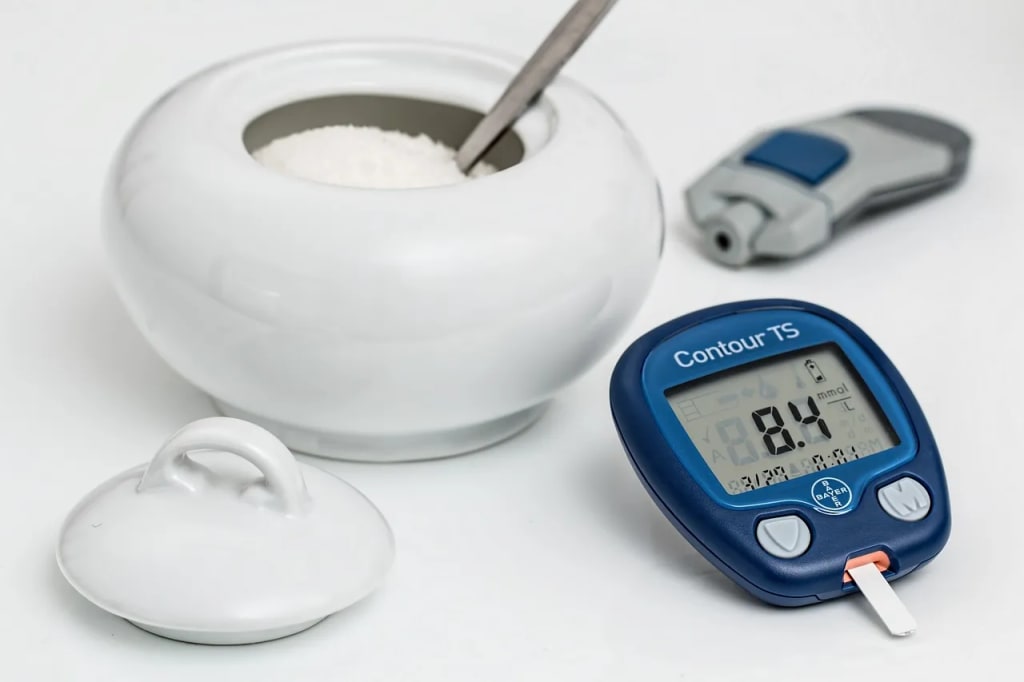Diabetes, Hypertension, and Obesity: The Three Monsters Under Your Bed That You Need to Fight Off
Learn how lifestyle modification can conquer diabetes, hypertension, and obesity. Discover practical strategies to improve your health today.

Do you remember when you were a kid afraid of monsters under your bed? You would hide under your blanket and hope that they would go away. Well, guess what? They didn't go away. They just changed their forms.
Now they are called diabetes, hypertension, and obesity. And they are not hiding under your bed anymore. They are hiding inside your body.
These three diseases are among the most common and deadly non-communicable diseases (NCDs) in India and globally. They are caused by poor lifestyle choices such as lack of exercise, unhealthy diet, bad sleep habits, and stress. They can lead to serious complications such as heart attack, stroke, kidney failure, blindness, amputation, and even death.
But don't worry. There is a way to fight off these monsters and keep them at bay. It's called lifestyle modification. It's a simple yet powerful way to prevent and treat these diseases at early stages by making some changes in your daily habits and routines.
In this article, I will explain what lifestyle modification is and how it works. I will also provide some data and statistics on the prevalence and impact of these diseases in India and globally. I will also address some common challenges and barriers to lifestyle modification and provide some tips and strategies to overcome them.
What is Lifestyle Modification and How Does it Work?
Lifestyle modification is a term that refers to changing one's habits and behaviors that affect one's health and well-being. It involves making conscious choices that improve physical, mental, emotional, and social health.
Some examples of lifestyle changes that can improve health outcomes are:
- Exercising regularly: Physical activity can lower blood sugar, blood pressure, cholesterol, and body weight. It can also improve mood, energy, sleep quality, and immunity. Aim for at least 150 minutes of moderate-intensity aerobic exercise per week or 75 minutes of vigorous-intensity aerobic activity per week or a combination of both.
- Eating healthier: A balanced diet can provide essential nutrients for optimal health. It can also prevent or control diabetes, hypertension, and obesity by regulating blood sugar, blood pressure, cholesterol, and body weight. Avoid processed foods, sugar, salt, oil, trans fats, refined carbs, and red meat. Eat more fruits, vegetables, whole grains, legumes, nuts, seeds, lean protein, low-fat dairy products, and healthy fats.
- Sleeping better: Good sleep can restore one's physical and mental health. It can also regulate blood sugar, blood pressure, cholesterol, and body weight. It can also improve mood, memory, concentration, and creativity. Aim for 7–9 hours of quality sleep per night. Avoid caffeine, alcohol, nicotine, and blue light before bedtime. Follow a regular sleep schedule and create a comfortable and dark sleeping environment.
- Managing stress: Stress can have negative effects on one's health and well-being. It can increase blood sugar, blood pressure, cholesterol, and body weight. It can also impair mood, immunity, digestion, and reproduction. Learn to cope with stress in healthy ways such as through meditation, yoga, breathing exercises, hobbies, music, laughter, or social support. Avoid unhealthy coping mechanisms such as smoking, drinking, overeating, or drugs.
- Seeking professional help: Sometimes lifestyle modification alone may not be enough to prevent or treat these diseases. In such cases, it is important to consult a doctor or a health care provider who can prescribe medication, monitor progress, and provide guidance and support. Don't be afraid or ashamed to seek professional help when needed. It can save your life.
These are some of the benefits of lifestyle modification:
- It can prevent or delay the onset of these diseases in people who are at risk.
- It can control or reverse these diseases in people who already have them.
- It can reduce the need for medication or lower the dosage of medication.
- It can improve the quality of life and reduce the risk of complications and death.
- It can also prevent or treat other health problems such as depression, anxiety, cancer, osteoporosis, arthritis, etc.
Here are some examples of how lifestyle modification can reverse these diseases and improve health outcomes:
One of my clients, Suraj, had type 2 diabetes and was on high doses of medication when he approached me for cycling training. He was determined to change his lifestyle and improve his health. Over the span of 3–4 years, he followed a regular exercise routine, a balanced diet, a good sleep schedule, and stress management strategies. As a result, he was able to control his diabetes and reduce his medication requirements. His doctors were impressed by his progress and praised his efforts.
One of my friends, Priya, had obesity and hypertension and was at a high risk of heart disease and stroke. She was unhappy with her weight and her blood pressure and wanted to make a change. She joined a yoga class and started practicing yoga every day. She also changed her eating habits and switched to a more plant-based diet. She avoided processed foods, and sugar, and reduced her intake of salt and oil. She drank plenty of water and herbal teas. Within a year, she lost 20 kg and lowered her blood pressure to normal levels. She felt more energetic, confident, and peaceful. She also made new friends in her yoga class and enjoyed social support.
You can also have your own success story if you start your lifestyle modification today.
The Prevalence and Impact of These Diseases in India and Globally
Now that you know what lifestyle modification is and how it works, let me show you some data and statistics on the prevalence and impact of these diseases in India and globally.
According to a pan-India study conducted by the Madras Diabetes Research Foundation in collaboration with the Indian Council of Medical Research (ICMR) and the Union health ministry published in The Lancet Diabetes & Endocrinology journal on Thursday:
- More than 11% of the Indian population is diabetic and 35.5% of Indians suffer from hypertension.
- Generalized obesity and abdominal obesity in India stood at 28.6% and 39.5%, respectively.
- The prevalence of these diseases varied across states, regions, urban-rural areas, genders, and socio-economic groups.
According to the study report "India: Health of the Nation's States"- The India State-Level Disease Burden Initiative in 2017 by the Indian Council of Medical Research (ICMR):
- The number of deaths due to Non-Communicable Diseases (NCDs) in India increased from 37.9% in 1990 to 61.8% in 2016.
- The leading causes of NCD deaths in India were cardiovascular diseases (28.1%), chronic respiratory diseases (10.9%), cancers (8.3%), diabetes (3.1%), kidney disease (2%), neurological disorders (1.9%), mental disorders (1.4%), etc.
- The disability-adjusted life years (DALYs) due to NCDs increased from 30.5% in 1990 to 55.4% in 2016.
According to the World Health Organization:
- Noncommunicable diseases (NCDs) kill 41 million people each year, equivalent to 74% of all deaths globally.
- Each year, 17 million people die from an NCD before age 70; 86% of these premature deaths occur in low- and middle-income countries.
- Cardiovascular diseases account for most NCD deaths, or 17.9 million people annually, followed by cancers (9.3 million), chronic respiratory diseases (4.1 million), and diabetes (2.0 million including kidney disease deaths caused by diabetes).
These data and statistics show that these diseases are a major public health problem affecting millions in India and globally. They also show that there is an urgent need to address these diseases and prevent their devastating consequences.
The Common Challenges and Barriers to Lifestyle Modification
You may be wondering why people don't adopt lifestyle modification if it is so effective and beneficial for their health and well-being.
Well, some common challenges and barriers prevent people from changing their lifestyles for the better.
Some of them are:
- Lack of awareness: Many people are not aware of the causes, effects, and solutions of these diseases. They may not know the benefits of lifestyle modification or how to implement it. They may also have misconceptions or myths about these diseases or lifestyle modifications that prevent them from taking action.
- Lack of motivation: Many people are not motivated to change their lifestyle because they don't see immediate results or rewards. They may also lack the confidence or self-efficacy to change their habits and behaviors. They may also have some emotional or psychological barriers such as fear, denial, guilt, shame, or depression that hinder their motivation.
- Lack of support: Many people need more social support or professional guidance that can help them change their lifestyle. They may not have family, friends, colleagues, or community members to encourage, assist, or join them in their lifestyle modification journey. They may also not have access to healthcare providers who can prescribe, monitor, and advise them on their lifestyle modification plan.
- Lack of resources: Many people lack the resources or facilities that can facilitate their lifestyle modification. They may not have enough time, money, space, equipment, or opportunities to exercise, eat healthier, sleep better, or manage stress. They may also face environmental or cultural barriers such as pollution, traffic, weather, social norms, or peer pressure that make it difficult to change their lifestyle.
These are some of the common challenges and barriers that people face when they try to change their lifestyle for the better.

The Tips and Strategies to Overcome Them
But don't worry. Some tips and strategies can help you overcome these challenges and barriers and make your lifestyle modification easier and more enjoyable.
Some of them are:
- Educate yourself: Learn as much as you can about these diseases and lifestyle modifications. Read books, articles, blogs, podcasts, videos, or webinars that provide reliable and relevant information on the topic. Seek advice from experts or professionals who can answer your questions and clear your doubts. Be aware of the facts and avoid the myths.
- Set realistic goals: Set specific, measurable, achievable, relevant, and time-bound (SMART) goals for your lifestyle modification. For example, instead of saying "I want to lose weight", say "I want to lose 5 kg in 3 months by exercising for 30 minutes every day and eating a balanced diet". Break down your goals into smaller and manageable steps and track your progress and achievements.
- Reward yourself: Celebrate your successes and reward yourself for achieving your goals or milestones. For example, treat yourself to a movie, a massage, a new outfit, or a vacation when you reach your desired weight or blood pressure. Use positive reinforcement to boost your motivation and self-esteem.
- Seek support: Surround yourself with positive and supportive people who can help you improve your lifestyle. Join a group, a club, a class, or an online community that shares your interests and goals. Ask your family, friends, colleagues, or neighbors to join you in your lifestyle modification activities. Seek professional help from a doctor, a trainer, a coach, a counselor, or a therapist who can guide you and monitor you on your lifestyle modification plan.
- Use resources: Make use of the resources or facilities that are available to you or create your own. For example, use your smartphone, computer, or smartwatch to track your activity, calories, sleep, or stress levels. Use online platforms, apps, or videos to access exercise programs, diet plans, recipes, tips, or advice. Use your home, office, park, or gym as your exercise space. Use your kitchen, grocery store, restaurant, or delivery service as your food source.
- Overcome barriers: Identify and overcome the environmental or cultural barriers that prevent you from changing your lifestyle. For example, use a mask, an air purifier, or an indoor treadmill to avoid pollution. Use public transport, carpooling, cycling, or walking to avoid traffic. Use an umbrella, a hat, sunscreen, or appropriate clothing to avoid weather extremes. Use social media wisely and limit your exposure to harmful or misleading information. Use assertiveness skills and set boundaries to resist social norms or peer pressure.
These are some of the tips and strategies that can help you overcome the challenges and barriers to lifestyle modification.
In conclusion, diabetes, hypertension, and obesity are the three monsters you need to fight off under your bed. They are not only affecting your health and well-being but also millions of people in India and globally. They are caused by poor lifestyle choices that you can change for the better. Lifestyle modification is the best way to prevent and treat these diseases at early stages. It involves making some simple changes in your daily habits and routines that can improve your physical, mental, emotional, and social health. It can also prevent or treat other health problems that may affect you or your loved ones.
You have the power to fight off these monsters and keep them at bay. You just need to take the first step.
Join our Telegram Group "ActiveLife Society" -
About the Creator
Tushar Bhangale
Triathlon Coach, Movement Specialist, and Preventive Health Expert.
Founder of www.sculptingyoustrong.com.
Free Telegram Community https://t.me/+Kn6v5bPvyhgxMTE9
Follow more here






Comments
There are no comments for this story
Be the first to respond and start the conversation.